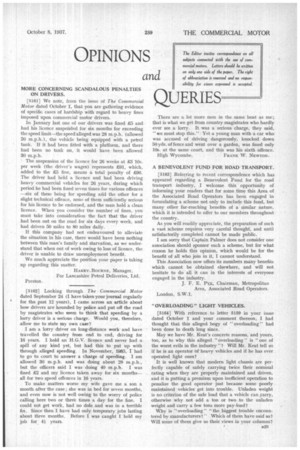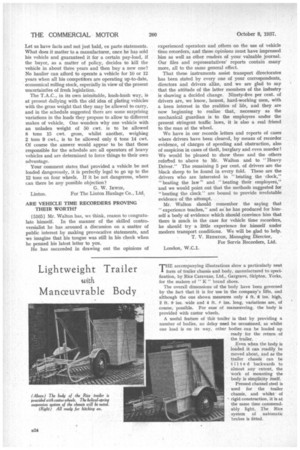OPINIONS
Page 57

Page 58

If you've noticed an error in this article please click here to report it so we can fix it.
and
QUERIES
MORE CONCERNING SCANDALOUS PENALTIES ON DRIVERS.
[5161] We note, from the issue of The Commercial Motor dated October 1, that you are gathering evidence of specific cases of hardship with regard to heavy fines imposed upon commercial motor drivers.
In January last one of our drivers was fined £5 and• had his licence suspended for six months for exceeding the speed limit—the speed alleged was 28 m.p.h. (allowed 20 rn.p.h.), the vehicle being equipped with a petrol tank. If it had been fitted with a platform, and there had been no tank on, it would have been allowed 30 m.p.h.
The suspension of the licence for 26 weeks at £3 10s. per week (the driver's wages) represents 191, which, added to the 15 fine, means a total penalty of 196. The driver had held a licence and had been driving heavy commercial vehicles for 26 years, during which period he had been fined seven times for various offences —six of these being for speeding and the other for a slight technical offence, none of them sufficiently serious for his licence to be endorsed, and the man held a clean licence. When you consider the number of fines, you must take into consideration the fact that the driver had been out on the road for six days every week, and had driven 50 miles to 80 miles daily.
If this company had not endeavoured to alleviate the situation in his case, there would have been nothing between this man's family and starvation, as we understand that when out of work owing to loss of licence, the driver is unable to draw unemployment benefit.
We much appreciate the position your paper is taking up regarding this matter.
HARRY., BOURNE., Manager, For Lancashire Petrol Deliveries, Ltd.
Preston.
[5162] Looking through The Commercial Motor dated September 24 (I have taken your journal regularly for the past 12 years), I came across an article about how drivers are hounded by police and put off the road by magistrates who seem to think that speeding by a lorry driver is a serious charge. Would you, therefore, allow me to state my own case?
I am a lorry driver on long-distance work and have travelled the country from end to end, driving for 16 years. I hold an H.G.V. licence and never had a spill of any kind yet, but had this to put up with through alleged speeding. In November, 1985, I had to go to court to answer a charge of speeding. I am allowed 30 m.p.h. and was doing about 28 m.p.h., but the officers said I was doing 40 m.p.h. I was fined 12 and my licence taken away for six months— all for two speed offences in 16 years.
To make matters worse my wife gave me a son a month after the case ; she was in bed for seven months, and even now is not well owing to the worry of police calling here two or three times a day for the fine. I could not get work, had no dole and was in a terrible fix. Since then I have had only temporary jobs lasting about three months_ Before I was caught I held my job for 4i years.
There are a lot snore men in the same boat as me; that is what we get from country magistrates who hardly ever see a lorry. It was a serious charge, they said, "we must stop this." Yet a young man with a car who was accused of driving dangerously, knocked down 50 ycis. of fence and went over a garden, was fined only 10s. at the same court, and this was his sixth offence_ High Wycombe. FRANK W. NEWTON.
A BENEVOLENT FUND FOR ROAD TRANSPORT.
[5163] Referring -to recent correspondence which has appeared regarding a Benevolent Fund for the road transport industry, I welcome this opportunity of informing your readers that for some time this Area of the Associated Road Operators has been engaged in formulating a scheme not only to include this fund, but many other far-reaching benefits of a similar nature, which it is intended to offer to our members throughout the country.
As you will readily appreciate, the preparation of such a vast scheme requires very careful thought, and until satisfactorily completed cannot be made public.
I am sorry that Captain Palmer does not consider one association should sponsor such a scheme, but for what reason he holds this opinion, which would be for the benefit of all who join in it, I cannot understand.
This Association now offers its members many benefits which cannot be obtained elsewhere, and will not hesitate to do all it can in the interests of everyone engaged in the industry.
J. F. E. Pv-E, Chairman, Metropolitan Area, Associated Road Operators. London, S.W.1.
"OVERLOADING" LIGHT VEHICLES.
[5164] With reference to letter 5159 in your issue dated October 1 and your comment thereon, I had thought that this alleged bogy of " overloading " had been done to death long since.
May we have Mr. Keat's concrete reasons, and yours, too, as to why this alleged " overloading " is "one of the worst evils in the industry "? Will Mr. Keat tell us if he is an operator ofheavy vehicles and if he has ever operated light ones?
It is well known that modern light chassis are perfectly capable of safely carrying twice their nominal rating when they are properly maintained and driven, and it is putting a premium upon inefficient operation to penalize the good operator just because some poorly maintained vehicles get into trouble. Unladen weight is no criterion of the safe load that a vehicle can carry, otherwise why not add a ton or two to the unladen weight and carry a few tons more pay-load?
Why is "overloading" "the biggest trouble encountered by manufacturers?" Which of them have said so? Will some of them give us their views in your columns? a2.3
Let us have facts and not just bald, ex parte statements. What does it matter to a manufacturer, once he has sold his vehicle and guaranteed it for a certain pay-load, if the buyer, as a matter of policy, decides to la the vehicle in about three years and then buy a new one? No haulier can afford to operate a vehicle for 10 or 12 years when all his competitors are operating up-to-date, economical rolling stock, especially in view of the present uncertainties of fresh legislation.
The T.A.C., in its own inimitable, hush-hush way, is at present dallying with the old idea of plating vehicles with the gross weight that they may be allowed to carry, and in the schedule suggested there arc some surprising variations in the loads they propose to allow to different makes of vehicle. One wonders why one vehicle with an unladen weight of 50 cwt. is to be allowed 8 tons 15 cwt. gross, whilst another, weighing 2 tons 9 cwt., is to be allowed only 6 tons 14 cwt. Of course the answer would appear to be that those responsible for the schedule are all operators of heavy vehicles and are determined to force things to their own advantage.
Your comment states that provided a vehicle be not loaded dangerously, it is perfectly legal to go up to the 12 tons on four wheels. If it be not dangerous, where can there be any possible objection?
G. W. IRWIN,
Linton. For The Linton Haulage Co., Ltd: ARE VEHICLE TIME RECORDERS PROVING THEIR WORTH?
[5165] Mr. Walton has, we think, reason to congratulate himself. In the manner of the skilled controversialist he has aroused a discussion on a matter of public interest by making provocative statements, and we imagine that his tongue was still in his cheek when he penned his latest letter to you.
He has succeeded in drawing out the opinions of experienced operators and others on the use of vehicle time recorders, and those opinions must have impressed him as well as other readers of your valuable journal. Our files and representatives' reports contain many more, all to the same general effect.
That these instruments assist transport directorates has been stated by every one of your correspondents, directors and drivers alike, and we are glad to say that the attitude of the latter members of the industry is showing a decided change. Ninety-five per cent. of drivers are, we know, honest, hard-working men, with a keen interest in the realities of life, and they are now beginning to realize that, necessary as the mechanical guardian is to the employers under the
• present stringent traffic laws, it is also a real friend to the man at the wheel.
We have in our records letters and reports of cases where drivers have been cleared, by means of recorder evidence, of charges of speeding and obstruction, also of suspicion in cases of theft, burglary and even murder ! We would be pleased to show these and the others referred to above to Mr. Walton and to " Heavy Driver." The remaining 5 per cent, of drivers are the black sheep to be found in every fold. These are the drivers who are interested in "boating the clock," "beating the law and " beating their employers," and we would point out that the methods suggested for "beating the clock" are bound to provide irrefutable evidence of the attempt.
Mr. Walton should remember the saying that "experience teaches," and as he has produced for himself a body of evidence which should convince him that there is much in the case for vehicle time recorders, he should try a little experience for himself under modern transport conditions. We will be glad to help.
T. V. REDSTON, Managing Director, For Servis Recorders, Ltd. London, W.C.1.




























































































